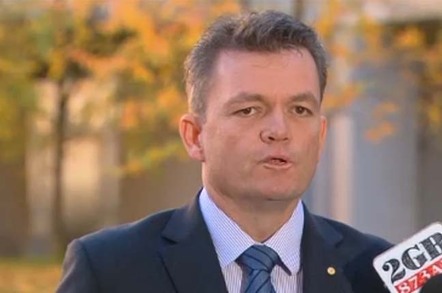Oz opposition caves, offers encryption backdoor compromise
Mark Dreyfus offers to rubber-stamp legislation if only counter-terror agencies get decryption

The AFP’s Andrew Colvin is a backer of the Assistance and Access bill
Mark Dreyfus, the Labor opposition’s shadow Attorney General, has offered a compromise on Australia’s controversial encryption backdooring bill that could see it passed, but with its operation restricted to counter-terrorism agencies.
The request for urgency, Dreyfus said, was driven by the government’s “short term” concerns about counter terrorism.
“One of the options for the committee is to look at potentially an interim report, interim processing of part of the bill, in order that the government’s stated purpose of urgency can be served, while the committee continues to consider the remainder of the bill and tries to deal with the multitude of concerns that have been expressed”, he said.
Responding to the Australian government’s demand that its forced-decryption legislation be fast-tracked, the parliamentary committee scrutinising the bill had extra short-notice hearings yesterday.
The Parliamentary Joint Committee on Intelligence and Security (PJCIS) heard from spy agencies in private, before opening the hearing to he public.
ASIO director Duncan Lewis told the public hearing: “We are moving inexorably towards universal, ubiquitous encryption”, and called for the legislation to be passed as soon as possible.
“We are not going to a provider and saying ‘we want you to give us the keys to your encryption’,” he told the committee. Likening ASIO’s aims to a hotel raid, Lewis said the agency wants the key to one room, not the “master key of the hotel”.
Lewis also highlighted the indemnity the bill offers to companies that assist agencies like ASIO, a protection currently lacking. Industry has assisted law enforcement in the past, he said, but “The point is that there is no requirement for industry to assist,” and those companies that cooperate lack protections: “They would obviously require some form of immunity.”
“We’re trying to access the communication between individuals in the main… if that communication is encrypted, it is a real challenge to understand the nature of that. What we are asking is that individual telcos, individual companies, on-top providers… to give us their best assistance in understanding the nature and the content (where we have a warrant) of that communication”, Lewis continued.
Lewis was careful not to directly echo calls from prime minister Scott Morrison and home affairs minister Peter Dutton to rush the legislation through, emphasising that the timing of the laws is a “matter for the parliament and the government to decide.”
Lewis was backed by Australian Federal Police commissioner Andrew Colvin, who said the “operational urgency attached to that” is now becoming “urgent”. He also echoed Lewis’s statement that it’s “not about breaking encryption,” but rather getting access to what the AFP already has a “lawful power” to access.
Neil Paterson of Victoria Police said the issue isn’t criminals “going dark” – they “absolutely” are already dark.
However, PJCIS chair Andrew Hastie has kept the currently-scheduled hearings (the last of which is December 4) in place. That makes scheduling a headache for the government, since parliament rises for the year on December 6.
That urgency prompted shadow attorney-general Mark Dreyfus to offer a compromise: the PJCIS could send an interim report back to parliament, allowing parliament to consider the legislation, but restricting its use to anti-terrorism agencies.
Dreyfus did not, however, address questions of feasibility that have already been raised in the PJCIS inquiry – whether end-to-end encryption can be cracked without introducing backdoors that would place all nternet communications at risk. ®
Sponsored: Following Bottomline’s journey to the Hybrid Cloud
READ MORE HERE

